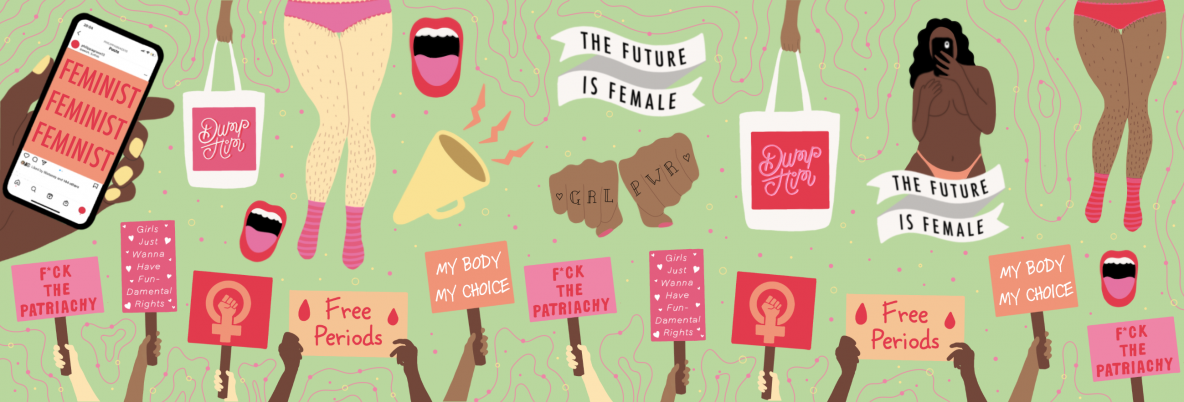pop feminism: a work in progress?
By Annabel White / 30 March 2021
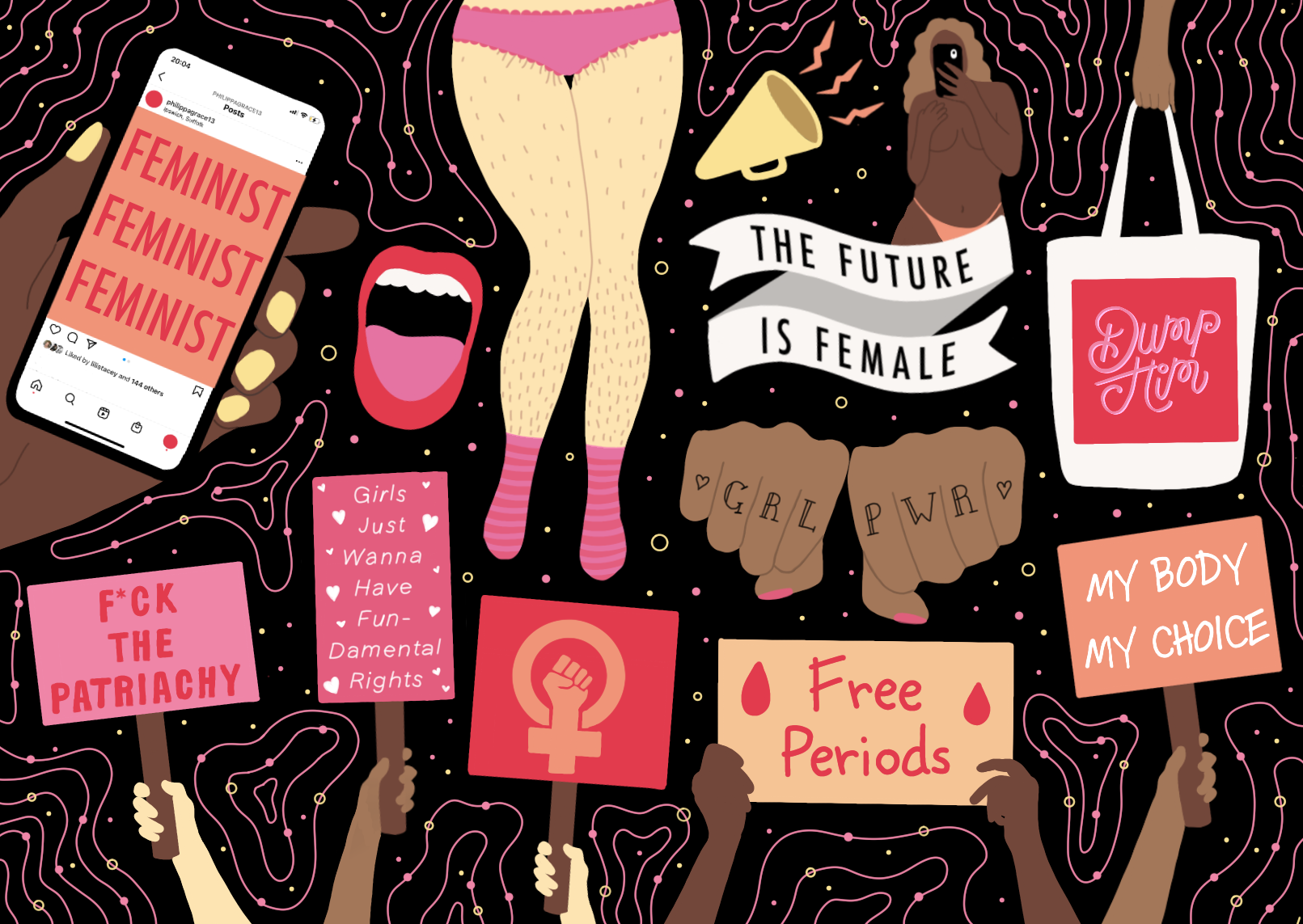
Illustration by Philippa Mwayi
Pop feminism is a particular stream of feminism that has gained tract over Instagram in recent years.
It is an approach to feminism that is predominantly perpetuated and promoted by young women, particularly social media influencers, who transform feminist ideologies into content to be understood and absorbed on a large scale. Pop feminism has changed a movement which previously labelled pioneers for gender equality as hairy-legged, bra-burning misandrists into something accessible for the masses. In short, pop feminism has made feminism ‘cool’.
Unsurprisingly, it gets its fair share of bad press. Critics have labelled it ‘feel-good feminism’, ‘marketplace feminism’, ‘faux-feminism’, and the list goes on. This stream of gender equality appears to be on the front end of a lot of name-calling. In The Aftermath of Feminism, Angela McRobbie argues that gender equality progress has been swallowed or halted? by mainstream media, creating a growing sense of individualism at the expense of collective struggle. I can see where she’s coming from. Many young people become involved in the movement via social media (I mean obviously, where else do we spend most of our time?) and there is no place like Instagram to promote a sense of self, whether intentional or not. This is essential to consider even through the lens of necessary social movements.
Influencer-produced content is largely self-help related. It encourages women to self-improve by building self-confidence, establishing self-respect and setting boundaries for themselves. There is a key word here–and it’s not even a word but a prefix–and that is self. The problem arises when we herald influencers as icons, idols, or goddesses, and an Instagram tile becomes synonymous with the face of modern day feminism. Pedestals exist to be knocked down and there’s no one we love to poke holes in more than the women sitting on top of them.
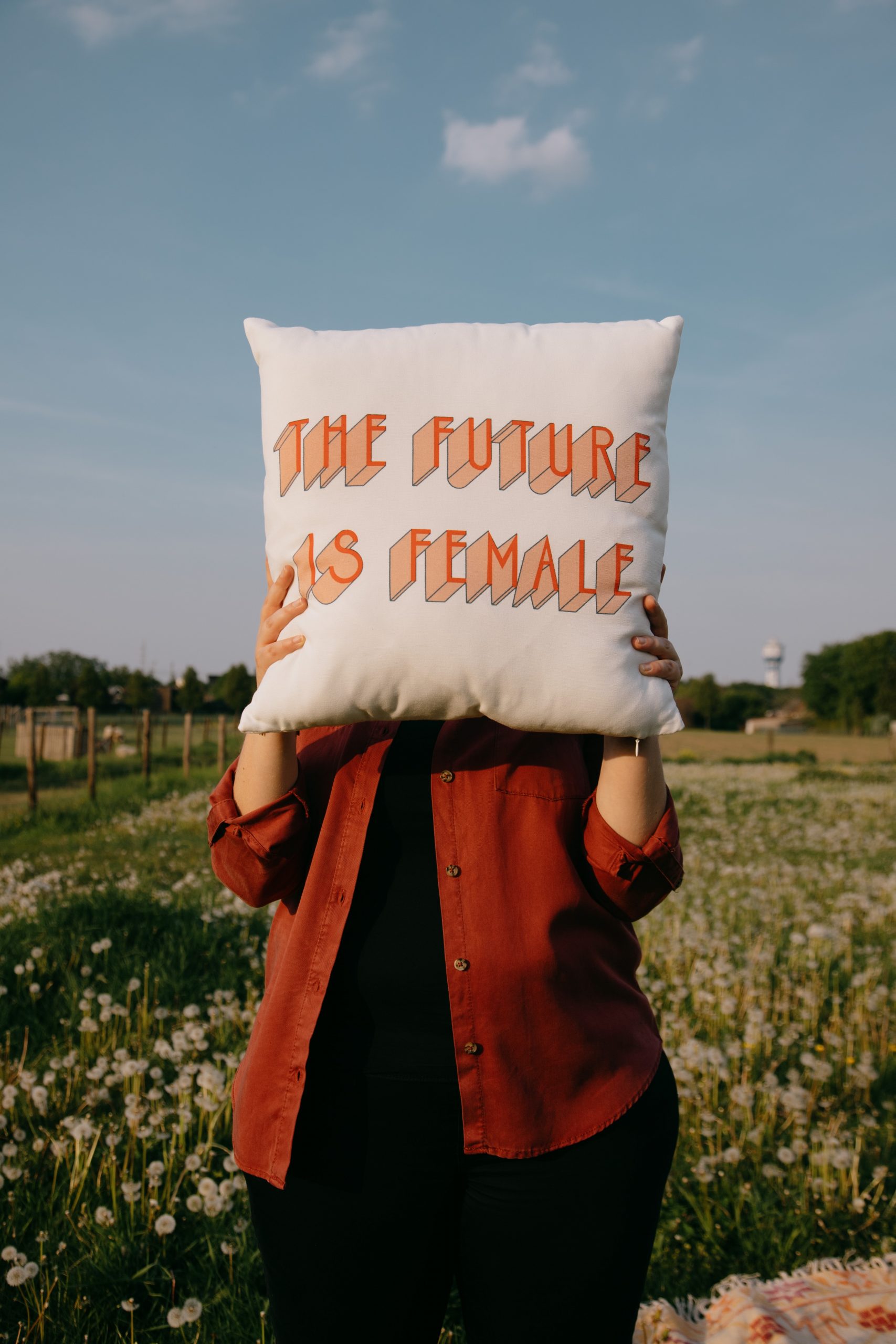
Photo by Sinitta Leunen on Unsplash
McRobbie makes some valid points, but I disagree with her when she criticises what she calls “commercial sexuality”.
She condemns both pole dancing and flashing your tits (although I’m unsure why they’re discussed collectively when one is a form of exercise, and the other is just a fun drunken activity). And she’s not the only one. More recently, Andi Ziesler has expressed similar concerns in her book, We Were Feminists Once. She worries that this “mainstream, celebrity, consumer embrace of feminism’’ positioned as ‘‘a cool, fun, accessible identity that anyone can adopt” is depoliticising and decontextualising a collective movement whose work is by no means done.
Maybe this is just striking a nerve for me. I follow the influencers, I get wrapped up in the online feuds, I own the books, the t-shirts and the tote bags. Maybe I just feel a little bit stung. Though I can’t help but feel that the existence of this kind of influencer is infinitely better than the ones that used to dominate.
Through pop feminism, we are tackling issues of sexuality, of masturbation, of body hair, of unlearning biases, of prescribed gender roles. We have the influencers to at least partially thank for this. Does the focus on our own individual empowerment mean we are too distracted to keep the collective struggle going? I don’t think so. What I do think is that it’s debasing to assume the millenial feminist is too busy combing her pubes and getting acquainted with her clitoris to bother caring about issues further afield. There are the trivial feminist issues and then there are the terrifyingly urgent ones. Discussing one doesn’t mean we have to ignore the other.
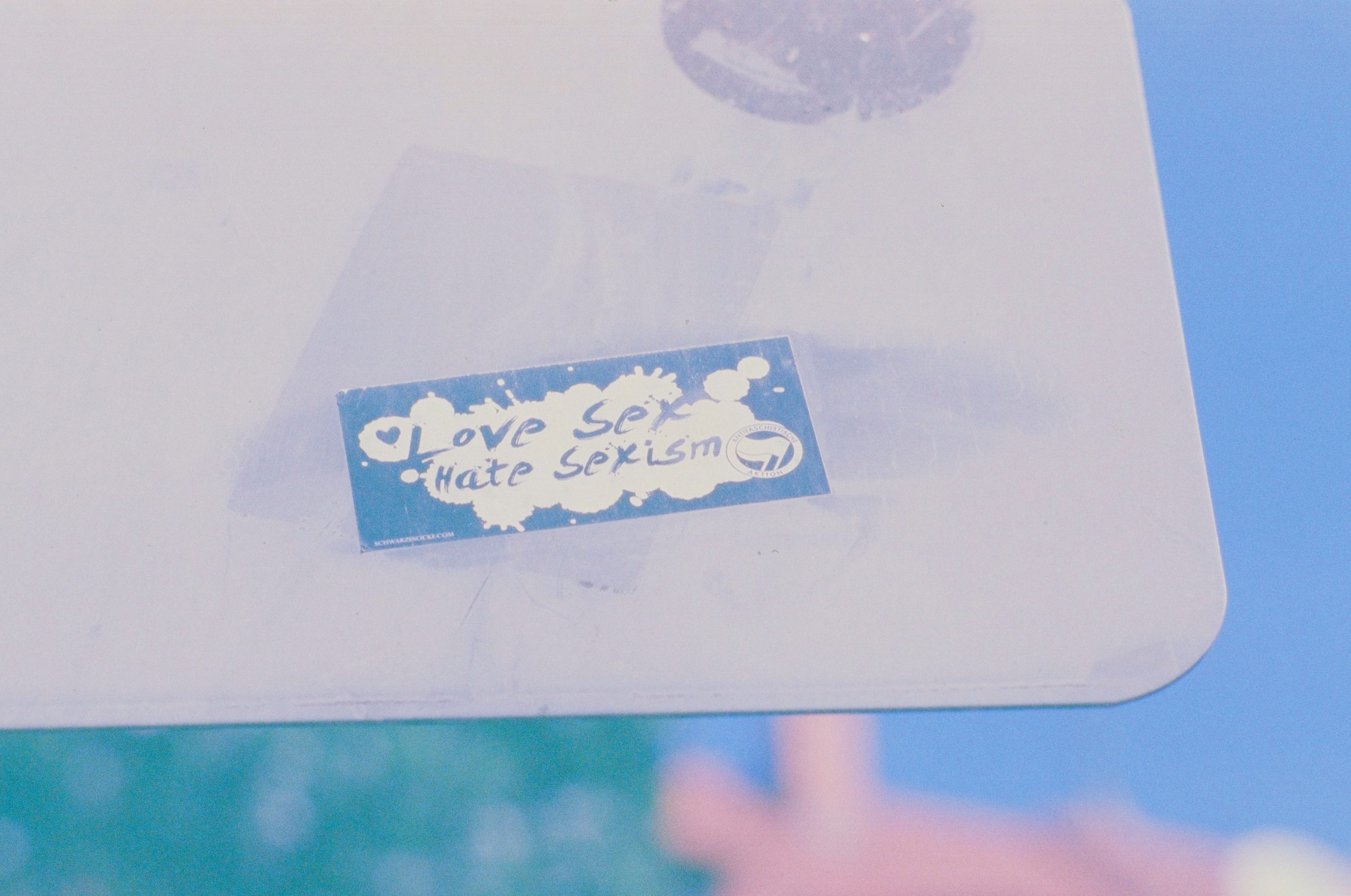
Photo by Markus Spiske on Unsplash
When model Amber Rose ‘unveiled’ her vagina to the world via an Instagram post in 2017, the backlash was rooted in the idea that modern-day feminism had taken a reductive turn.
But this doesn’t make any sense. Why can’t we be sexually liberated without reducing feminism to just sexual liberation? Why does it have to be one or the other? We can and should have it both ways. Andi Ziesler spends three pages of her book critiquing the space that the politics of waxing occupies. She tells us there are More Urgent Things we should be discussing, though she devotes little time to discussing them, other than to repeatedly remind us of their urgency. This may be ironic, but it is certainly true. The current feminist movement centres around the type of woman who already has many of her needs met, and as a result the movement has some colossal drawbacks. But I fear that by pointing fingers and arguing about ‘real’ issues versus ‘silly’ ones, we risk undermining the movement altogether.
Let’s take femvertising as an example (this is actually a word by the way): we question its performativity, its depth and its commitment to the cause, and rightly so. When corporations get involved in social movements, people get nervous because corporations represent that evil system we rely on for a living but vocally hate at all times: capitalism. EDF’s campaign to encourage girls into STEM subjects might be performative, and Dove’s Real Beauty campaign might be hypocritical, but when the alternative is not running these campaigns, surely the former is preferable?
Should we not apply the same principles to influencers? We know that their follower count is a social currency, we know that they monetise the messages they promote, but that doesn’t mean they’re not messages worth saying. Give us a way of gaining social awareness or accessing information from people whose work is not neatly tied to profit margins and maybe we’ll take it. There are problems that pop feminism may not be able to solve, but it doesn’t justify discarding the movement as a whole.
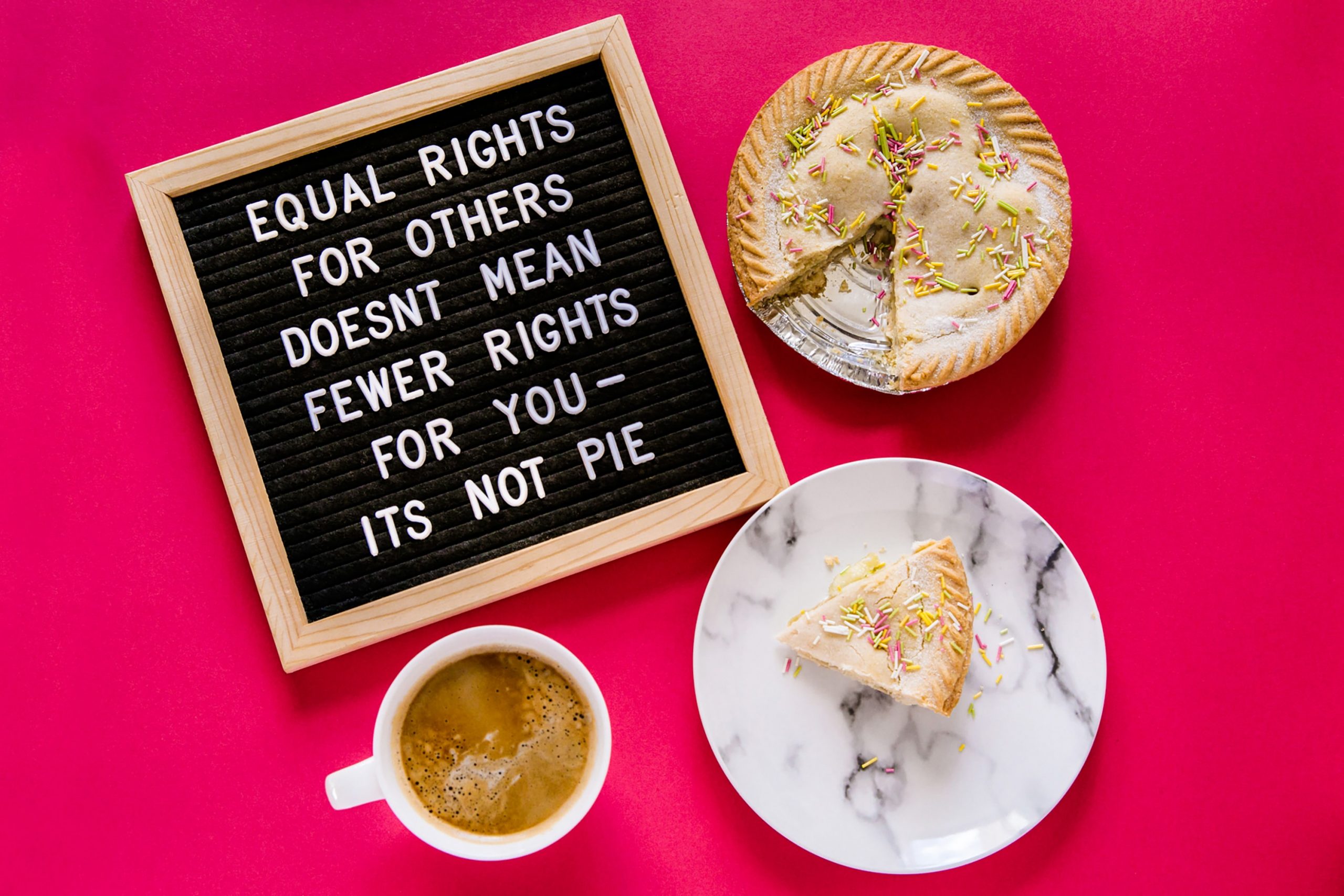
Photo by That's Her Business on Unsplash
It’s worth questioning the individuality of the movement and the emphasis of self, but we need to remember that self-care is at times political.
Yes, the notion itself has been commodified into overpriced spa days and wellness retreats, but just because it’s been hijacked by capitalism doesn’t make it ungrounded. Reclaiming autonomy over your body, your pleasure or your life is important, particularly if society tries to strip you of such luxuries. How can we turn to fight the bigger battles if we’re not first filling our own cups?
Nevertheless, the underlying issue and one that we cannot ignore is that pop feminism often forgets intersectionality. It leans too closely to White Feminism, a damaging movement that lifts up the "woke", slim, heterosexual, middle-class, white woman at the expense of marginalised people who fight harder for representation and equality. Pop feminism has a lot of work to do if it intends to be taken seriously as a movement; currently, it leaves too many people out of the conversation. When we talk about sexual assault, we need to elevate the fact that disabled people in the UK are almost twice as likely to fall victim to this. Our discussions on the pay gap have to address ethnicity as well as gender. Issues prominent in non-Western countries, such as FGM, human trafficking and child marriage, are too often overlooked in favour of more palatable topics we can fit into aesthetically-pleasing infographics. This needs to change.
So yes, there are limitations to pop feminism. It is perpetuated on a platform centered on performativity and profit, and it needs to be a hell of a lot more inclusive than it currently is. But the feminist movement as a whole is by no means perfect. Any kind of movement made up of millions of real-life human beings is going to have its deviations and disagreements. If pop feminism is a gateway into teaching young women autonomy over their own lives, if it helps to free us from the fundamental guilt, shame and self-consciousness that seep their way into being female, then by all means I think it’s a good thing. Its faults are not reason enough to strip it of its existence.
Art by
Words by
Share this article

